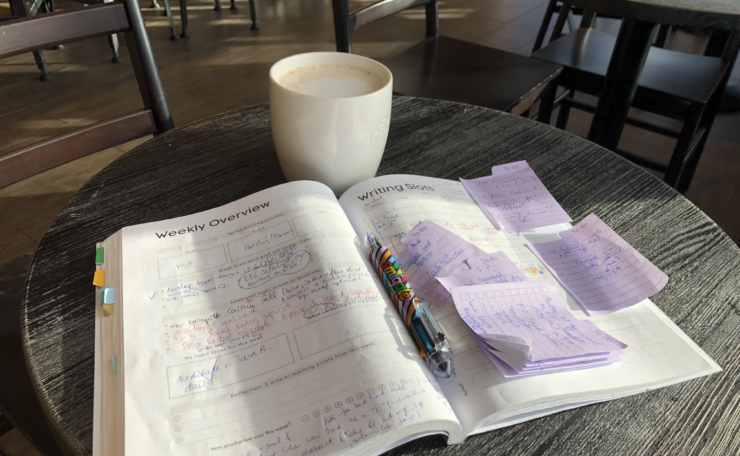How I protect myself from burnout and reclaim my focus
I’m hovering over a table at Starbucks on Saturday morning with a sore throat, Chai Latte, and exhaustion in my bones. It was a manic week, and I’m trying hard not to slip into self-blame. Because as a coach and former sufferer from burnout, I should probably know better.
Have you ever started your weekend thinking “I wish this week had never happened?” (Adding a bit of drama here, since I’m tired…)
After years of overwork, luckily I know how to pull myself up again.
Here’s my 3-part framework to identify an “out of control schedule” and turn it around into a better, more balanced week, so you can protect yourself from burnout and reclaim your focus.
Step 1: I leave my laptop in my bag, grab my planner, and go to a coffee shop
For some headspace, I need to leave the house at 7am the latest, so Starbucks next to a grubby shopping centre is my to go to. Because at home, I’m in mother mode. At the cafe, I get to think.
Why no laptop? My laptop and digital calendar don’t have a limit on appointments scheduled in.
There’s always more digital space.
My printed planner is limited. Once I write something into a slot, I have to cross it out to add something new.
It’s my overwork barometer.
My recommendation for is:
- To reflect on your week and plan ahead your priorities, get some space in a new environment
- Do it with with pen and paper to set some constraints on how you use your time
- Later, you can transfer it to your digital calendar
Step 2: I check how much I’ve written in the margins of my planner & and count those nasty post-its
I had an overcommitted week. It was brutal. Three evening engagements, lots of meetings, too many writing and coaching projects to be completed at the same time.
For someone with a burnout history, I should know better than stepping into such a week.
But I muddled through and kept myself upright with meditations (good!) and dark chocolate (I know…).
Now it’s Saturday and I feel wiped out — and my calendar reflects that to me.
Your take-away is:
- Be honest with yourself and look at the week you’ve had. A visual of you week is a great clue (are there breaks in between?)
- Check how you feel in your body right now.
- Dissect your week. Face your failures. And remember the strength you’ve shown (in my case, meditating) to get through it.
Step 3: Count wins and plan a lighter week (no extra post-it’s allowed!)
Finally, I count all my wins to lift myself up. Here are some of my wins as I’m sitting here and the sun comes out through the large glass front:
• Said an emotional goodbye to my 90-Day Writing Accelerator cohort (they rocked!)
• held my child with full attention and love on Tuesday morning when anxiety kicked in and she didn’t want to go to school
• wrote 1000w. for my MA dissertation that I’d been blocked with for weeks
• taught “Automatic Writing” at the London Writer’s Salon with vulnerability and openness
• Meditated daily within a Tara Brach course I’m taking
• Found my tribe with writers of fragments at an Irish Writing Centre online course
There are a few more wins, since the schedule was crammed! But I’ll stop here.
It’s a fine line between celebrating wins and acknowledging that it was too much.
Fewer wins without overwhelm would have been even better.
Over to you:
- Do you regularly count your wins at the end of the week?
- Which of these wins were ‘bought’ with overwork?
- Which of these did you fully enjoy, with breaks in between?
And finally, self-compassion
My process is a potent mix of planning, failure, overwhelm, holding myself and others, doing it a little too much, and in the end, reflection, gratitude, creating space to do better .
The 3-part framework above is simple, and it always brings me back to myself.
What would this look like for you?





